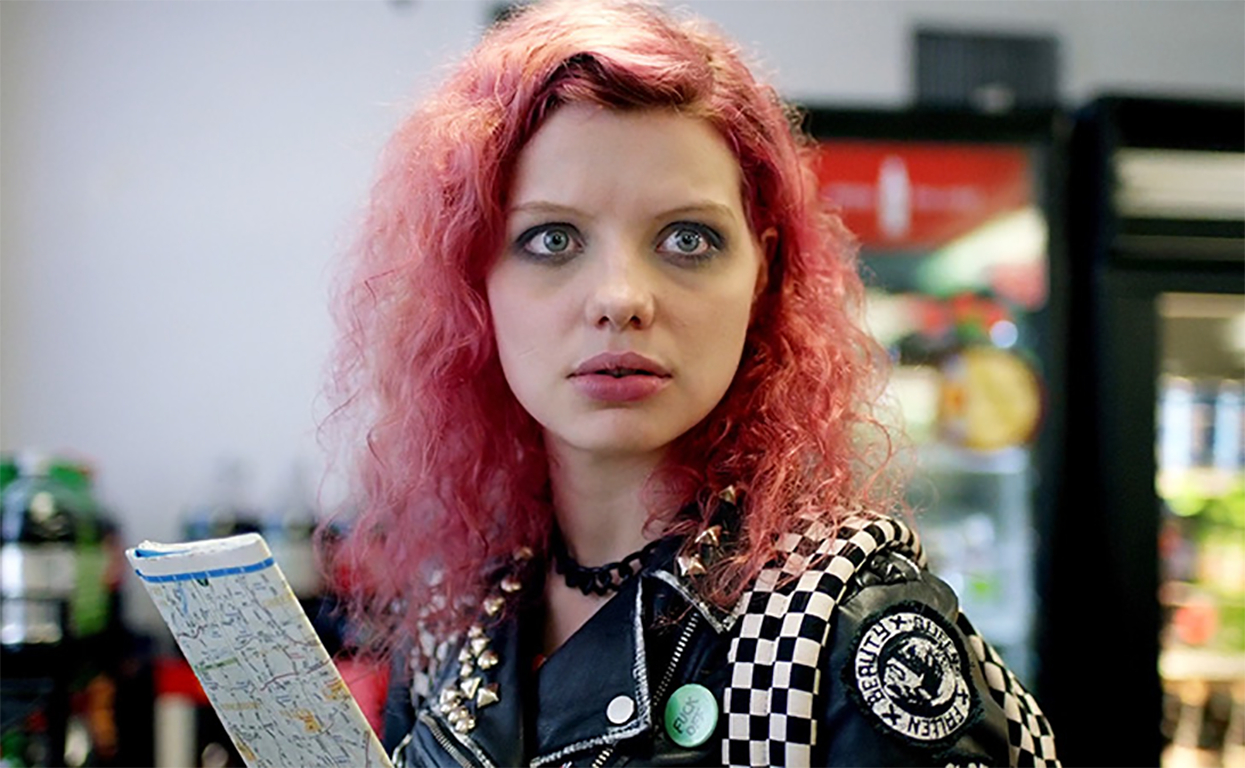Every time I'm back in New York, I'm always happy to catch up with friends, eat at restaurants that have absolutely zero Michigan equivalent, and see a bunch of limited release movies. What typically ends up happening is that after one amazing/busy day, I burn myself out and quickly turn into a shell of a human. Now that I'm almost 30, getting 5-6 hours of sleep each night just doesn't cut it anymore. I'm not used to waking up at 5:30 AM to run and then spending all day talking to people in an office. Fuck that noise. By the end of day, my brain is shredded wheat.
I ambitiously scheduled a phone interview with Jenn Wexler, director of the awesome horror film "The Ranger," on Thursday at lunch during my third full day in the city. After staying out late and peopling hard, I was massively tired and felt like I had consumed an edible by the time we talked. Jenn was nice enough to answer all of my questions and refrain from hanging up on me during the long ass pauses where I struggled to formulate sentences.
Before we get into my conversation with Jenn, here's a quick overview of what you can expect while watching. If you haven't already seen the film, you might want to steer clear of the actual interview portion or at least take note that there are some mild spoilers throughout.
Vibe:
Critics have been calling "The Ranger" a slasher film, but I'm not sure that label is entirely accurate and it might give you false expectations. Yes, people get killed in this movie, but the body count isn't exactly high and all of the kills don't adhere to slasher film protocol. This isn't "Halloween" (Carpenter, 1978) or "Scream" (Craven, 1996), nor is it trying to be. The tone is also markedly different than other films in the slasher genre.
"The Ranger" is set to a punk score that is deeply connected to the core group of characters. It's not just used to create a mood and manipulate the viewer (like the synth-heavy soundtracks I love dearly), it actually makes sense within the world of the film. Many times, the music is diegetic (playing from a car tape deck or boombox), which further helps ground it in reality.
While I was on the edge of my seat during a few scenes, this film didn't really make me feel jumpy or particularly terrified. Camp totally outweighs dread, which is not something I expected, but grew to enjoy.
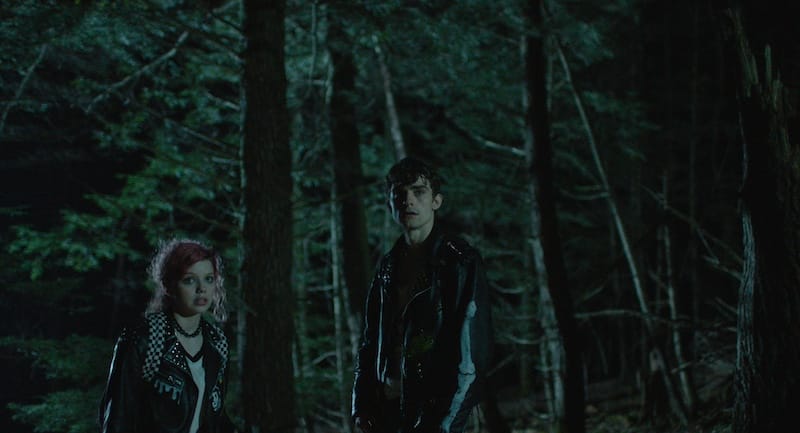
Best time to watch:
I would love to screen this movie in mid-October, right after a showing of the criminally underrated "Jennifer's Body" (Kusama, 2009). Both of those films are great ones to kick off 13 nights of Halloween. Did anyone else watch that programming block on Fox/ABC family in the late 90s/early 2000s? Starting October 19, they would show made-for-tv horror like "Deadly Invasion: The Killer Bee Nightmare" (O'Bannon, 1995) each night. I lived for that shit as a kid, along with the Disney Channel Halloween movies.
If you're a fan of punk music, I recommend watching for the soundtrack alone. I tried to keep track of bands and songs that I recognized throughout, but my list was sadly small by the film's end. It exposed me to a bunch of new music and helped me build out my "smash all the things" running playlist, so I am forever grateful.
Worst time to watch:
As previously mentioned, don't watch this film if you're looking for a recent, traditional slasher because I think you will be disappointed. Instead, check out Adam Wingard's "You're Next" (2011) or Sean Byrne's "The Loved Ones" (2009).
Where to watch:
"The Ranger" is streaming on AMC+ and VOD.
Quick Summary:
Chelsea (Chloe Levine) and her friends are at a punk show when things get out of hand and her boyfriend Garth (Granit Lahu) stabs a cop. Instead of turning themselves in, they escape to a cabin in the woods, left to Chloe by her late Uncle Pete (Larry Fessenden). Everything is going relatively fine until the group crosses paths with park ranger (Jeremy Holm) who takes the rules of the woods very seriously.
Interview with Jenn Wexler
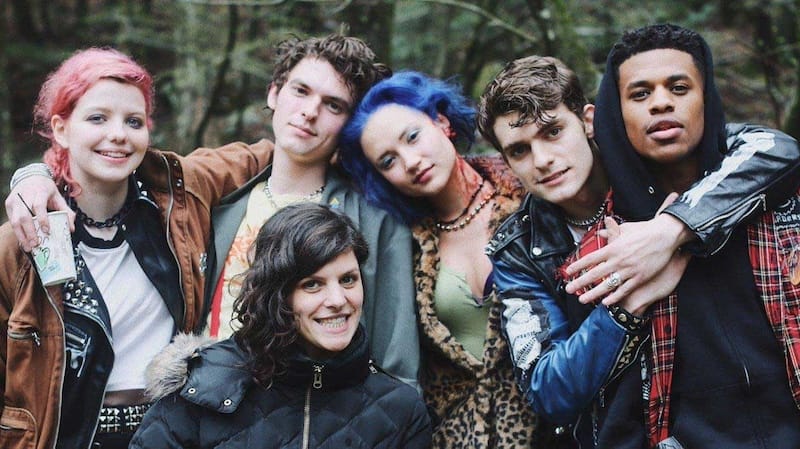
Woman in Revolt: One thing that immediately struck me is the title card graphics. Who designed those and how did you decide on the aesthetic?
Jenn Wexler: The designers who created the opening and closing title sequences are Mister Lobo and Dixie Lobo. They actually designed a bunch of fake band patches and t-shirts that the punks are wearing, too. They worked really closely with our costume designer on those, so that style was already baked into the movie in a very detailed way. They had also been creating flyers that we used to help promote the movie, so we really just embraced their aesthetic.
The vibe was meant to be like... early 80s MTV music video, comic book-y type stuff. The song underneath is by Rotten UK, which is the band that's playing in the opening party scene. That song is called "Animal Sacrifice." It was so perfect and I just fell in love with it. It all came together very nicely.
The thing I noticed as I was watching is how little of the music I recognized. I wouldn't call myself a huge punk fan, but I thought I would at least know a few songs.
I wanted the whole soundtrack to really feel like a cool mixtape that you discover or someone gives to you. We worked with Middagh Goodwin, our music supervisor, who was also a band promoter back in the 80s. He was tight with all of these different punk bands and reached out to them, told them about the movie, and found out who was on board. He worked with a lot of the bands directly and then gave me a bunch of different music to choose from. It was such a cool experience for me because I was able to sit with the cut of the movie, think about the songs, and figure out what went where thematically.
Who thought up the song based on the board in the woods with "leave no trace" on it?
As I was putting my lookbook together, I kept coming across a bunch of signs that said things like, "Leave nothing but footprints." So my co-writer and I wrote that into the script. When it was time for them to sing it, we just told them in the moment to do it, but like... make it punk!
Then later, there's a song that they sing in the van, and that was created by Wade MacNeil and Andrew Gordon Macpherson who were our composers. Wade was in Alexisonfire and is now in the band Gallows. They created that song before we started production and it kind of became something that the cast kept singing in between takes.
I definitely have some superficial questions to ask you. Chelsea's jacket is awesome. Who designed it? Did someone stud it by hand?
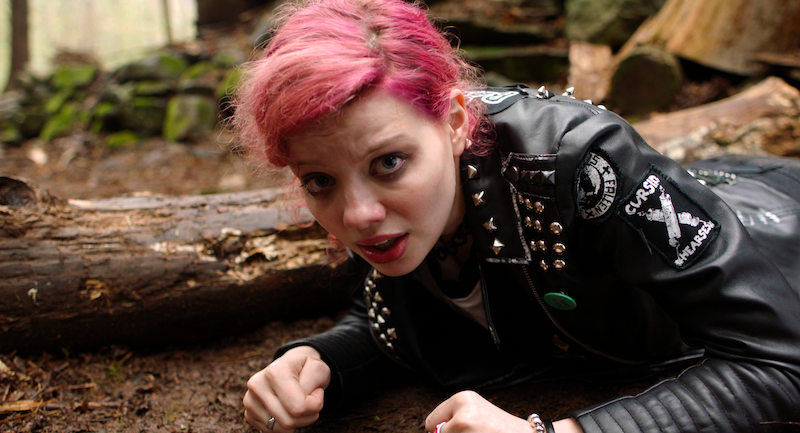
The costume designer, Samantha Hawkins, and her assistant, Sara Lott, both bought the jackets, did the studding, added all the patches... they are responsible for everything.
Well they did a great job because that jacket is fucking cool.
I gave Samantha some ideas in an email, but then she took everything and really made it come to life. My notes were like, "Chelsea's in a leather jacket, white tank top, and black jeans." They took those vague ideas and made them something special. Heather Buckley, one of our producers, knows every detail about what is and isn't right for the punk aesthetic, so she gave us a lot of pointers, too. It was a team effort.
"The Ranger" feels like a very ageless film to me. It could have easily taken place in the 80s or now.
When we were on set, I kept calling it 80s dreamland. I didn't want it to feel like real 80s, I wanted it to be like a heightened world: slightly surreal, slightly fairytale, slightly comic book.
If I could exist in 80s dreamland, I think I would.
Me too.
There were a lot of femme details in this film that I enjoyed... Chelsea's pink hair, Amber's (Amanda Grace Benitez) van. Were the seats of the van bedazzled? They were amazing.
I think there were stickers or beads on the seats. The story concept behind that is that it's Amber's van. She's been asleep in the backseat, the punks saw the van during the police raid, and stole it. She's been decorating it for as long as she's had it.
Aesthetically, I wanted to make a slasher movie with a color palette inspired by Lisa Frank. I feel like I haven't really seen that and I lovvve Lisa Frank. The van was a reference to "The Return of the Living Dead" (O'Bannon, 1985). There are things written on the van that are written on the car in that movie... and I knew I needed a light blue van. It's the Lisa Franked out "Return of the Living Dead" van.
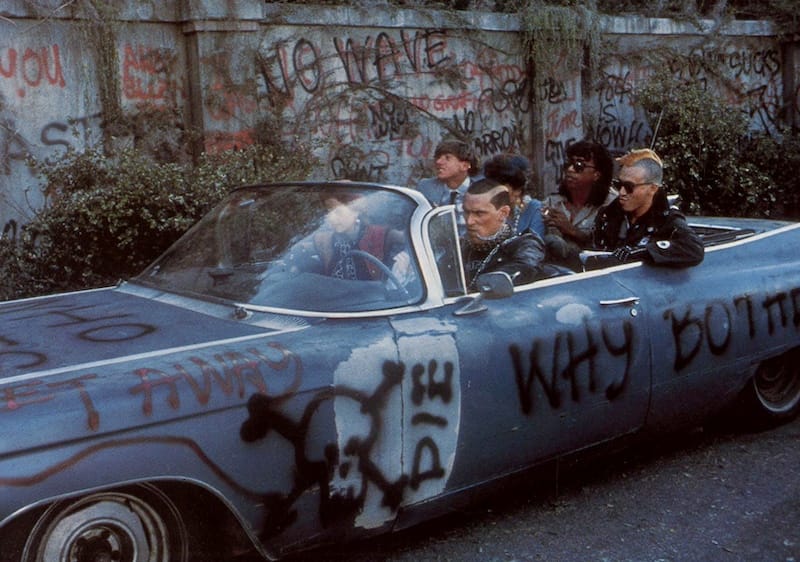
I wouldn't mind driving it.
It's sitting in a parking lot in New Jersey somewhere right now, so... it's up for grabs.
Tell me about your filming locations. Are the cabin scenes set in upstate New York?
Yeah, that's all around Woodstock. Actually, Larry Fessenden, who is the head of Glass Eye Pix and also plays Uncle Pete and acts as a producer on the movie, has a house up there. Through that, we've gotten to know the community really well and we just keep going up there and making movies. We know the head of the Hudson Valley Film Office. My producers and I started location scouting, looking at cabins. We shot at Minnewaska State Park, which is right around there, and the fire tower sequence was at Hunter Mountain.
I thought that fire tower looked familiar! What about the early scenes at the punk show?
That was shot in Brooklyn at a punk club called Don Pedro. Sadly, it closed shortly after, but not because of us! They were going to close anyway. We were one of the last things to happen there and it's really cool that we were able to capture it on film.
All the good New York music venues are closing. I don't even know what's still around.
My heart is always with underground shows and basement shows. Not that I go to that many anymore, but when I was a teenager, first discovering punk... you'd go to church basements and watch shows.
I feel like that doesn't happen anymore. When I was in high school, people would just have shows at their house. Maybe that type of stuff is still going on, but I don't know about it because I'm too old.
Let's hope that in suburban towns across the country, those types of shows still exist.
One thing I noted during the opening of the film is the scene where Garth pulls a knife on one of the girls. Even though he means it as a "joke," the other dudes are the only ones who laugh... the girls just look frozen and kind of horrified. It feels very intentional to me. Is there a reason you shot it that way?
Throughout the movie, this becomes a theme, but I think that was kind of touching back on when I was a teenager going to shows, or any time I was in groups dominated by guys. There was always some frustration with the sense of humor... thinking things are funny at women's expense. It's changing now, which is really cool. There's a conversation where these little nuances are being called out, but when I was growing up, it was tough. I always felt like, "This bugs me, I should say something against this type of humor." But if I said anything, I would become the target, so I wouldn't. This scene was a little meditation on that type of frustration.
Remember when I mentioned spoilers? HERE THEY COME.
It also just reminded me of being younger and feeling like... I enjoy punk music, but don't want to be part of any type of scene. It sometimes feels so prescriptive, like you're locked into a certain type of mentality and way of acting in order to belong. I think those types of requirements can be really isolating if you're like Chelsea and have another side to you that the people who are true diehards might not understand or respect.
Absolutely. And that's something I really wanted to explore with the movie. It kind of seems like the punks are the good guys because the ranger starts taking them out later on, but it's not that simple. The ranger and the punks both have codes of conduct, things you're supposed to do if you're really serious. They both have uniforms. They're actually very similar.
Then you have Chelsea — who is us— living in this world where people are constantly telling her who to be and what rules she needs to follow. She's just trying to listen to her true self amidst all this noise.
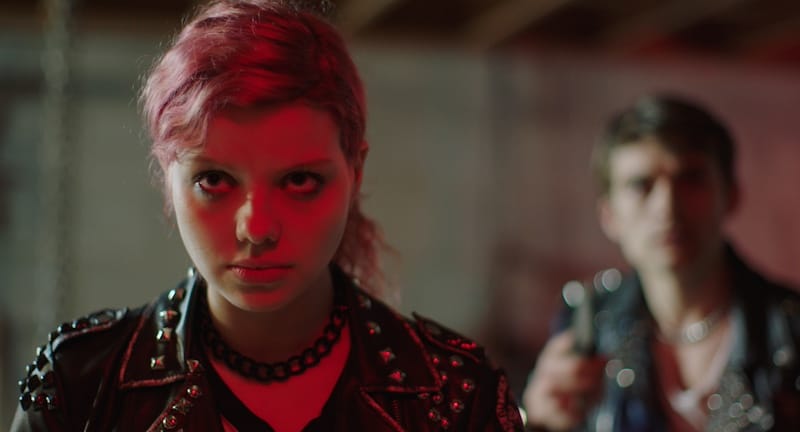
At the end of the film, I like that we still don't really know who Chelsea is or what's going on with her. Is she a wolf who enjoys hurting people or is she just someone who has damage from a bad thing that happened to her when she was a kid? I think it could go either way.
Something that I was really fascinated by and that Chloe Levine, who plays Chelsea, and I talked about a lot is the idea that... If something bad happens when you're a child, what is that memory like? You keep thinking back to that day, your mind starts to play tricks on you. We wanted to keep it open-ended on purpose because the bigger thing we were exploring is the memory itself and how that can affect you.
That's really interesting. I've watched a couple of things recently that explore memories and childhood trauma in really cool ways. Are you watching "Sharp Objects"?
I'm not, but I know I should be. People are saying great things about it.
It's a little slow to get started, but they're doing really interesting things with memory and childhood trauma.
This thing happened to Chelsea when she was young and she's been questioning herself ever since. "Am I bad? Did I do this? Was it an accident? Who am I really? Do I even know what's deep inside of me?" That plays really nicely with the whole wolf aspect... unleashing the world within you. My co-writer Giaco [Furino] and I were excited to explore those ideas.
Is the story that Giaco wrote the script when you were in college together but that it had been sitting for a while before getting made into a movie?
We went to the University of the Arts and both majored in screenwriting. We had to write screenplays for our senior year. This was his concept. When we workshopped our scripts, I was so into this idea of punks vs. a park ranger. It was more of a body count straight slasher back then. After we graduated, and had to find jobs to pay our rent, our screenplays went into a drawer.
A couple of years later, I started producing for Glass Eye Pix and I was starting to feel really comfortable making movies. I was thinking about what I wanted to direct, and I remembered his concept. I asked if he could find his old script and if we could update it together. Then we started fleshing out Chelsea's character, her relationship with the ranger, her relationship with the punks... and started pulling out different thematic threads.
It's cool that you were able to turn something from college into a finished product years later.
We're actually going, I think in September, to show the movie to the current screenwriting class. It's going to be nostalgic.
What did you do to raise money for the film? Were there any crowdfunding campaigns or grants?
We didn't use any crowdfunding platforms, but we did submit to a program called the Frontières Co-Production Market. It takes place during the Fantasia Film Festival in Montreal. We were selected to go to Montreal and pitch our project to a room full of industry and finance people. Larry and I went and did the pitch together. It's really cool, kind of like speed dating. You have a bunch of back-to-back meetings and get comfortable talking about your movie. Part of the job of directing is communicating your idea to every collaborator at every stage of the process, so it was helpful for getting me into that mindset.
One of the people who saw our pitch was Andrew van den Houten, who produced movies I was a fan of, like "The Woman" (McKee, 2011), "Jug Face" (Kinkle, 2013), and "All Cheerleaders Die" (Sivertson and McKee, 2013). He really responded to it and so his company, Hood River Entertainment, teamed up with Glass Eye Pix to produce the film together.
Was it hard for you to go from a producer role to a director role? Was there a big learning curve?
The whole process was amazing and I loved every moment of it. I had watched a lot of directors and worked very closely with them. I produced four movies before making "The Ranger." When you're an on-set producer, you're really hands-on, so any time something comes up, you're in it with the director, solving problems together. That whole experience was invaluable in preparing me to actually direct.
The only difference was that with directing, I'm actually the one talking to the different department heads and making creative decisions instead of offering ideas and helping the director formulate their thoughts... and doing the paperwork and other boring producer things.
It's definitely nice to have people who can mentor/help you. A lot of women I've spoken with have mentioned that part of what makes it hard to transition to directing is the feeling of not being prepared enough. Was that something you dealt with? Was it easier since you had go-to people for advice?
Even with people available to help, I still felt like I needed to understand everything before I could move into directing. Speaking in generalities, I feel like that's a weird side effect of living in our society... where we're trained differently than boys starting at a young age, and we feel like we really need to master something before we can do it. There are a lot of young male directors that have a certain audacity about them, which is awesome. I wish I had discovered my audacity earlier.
I personally always like to feel super prepared before I do something. I'm not confident unless I think I've considered all outcomes and can successfully deal with whatever comes my way. My male co-workers are not like that. They're confident in their abilities even when they don't know what the fuck they're talking about... it's all social conditioning.
These things are actually being talked about now, which is a good first step. People are questioning why things are a certain way and trying to change them.
I've seen a lot of really good female directed horror films recently. Are there any in particular that have resonated with you?
Absolutely. Two that I'm absolutely obsessed with are "Revenge" (Fargeat, 2018) and "Tigers are Not Afraid" (López, 2017). They're both outstanding movies. From the opening frame, I was onboard, and then I was completely into it until the closing credits.
I love both of those movies. "Revenge" especially reminds me of "The Ranger." Some of those little details, like Jen's pink star earrings, felt like they could have come from your film. I could see Amber wearing those earrings while hanging out in her van.
There are little details, and not just fashion details, in both of those films that, if you handed the same script to a male director, would not have been included. It's just a different experience that can't be recreated from a different perspective.
One thing I wanted to quickly mention is how much I appreciated the inclusion of a queer couple with zero commentary. They were just there, being represented, and it made me happy. Sadly, it's rare to see this in horror films.
When Giaco and I were developing the characters, one of the first conversations was about how Jerk and Abe are dating. It was just a character detail that we decided on... that they would do the things couples do when they're dating, like just cuddling in the corner or sometimes not even touching at all. Jeremy Pope, who plays Jerk, and Bubba Weiler who plays Abe, were totally in sync with each other from the moment they met. They asked me one question, which was like, "How long have they been together?" I told them two years and they said, "Cool." That's all they needed to know to bring that relationship to life.
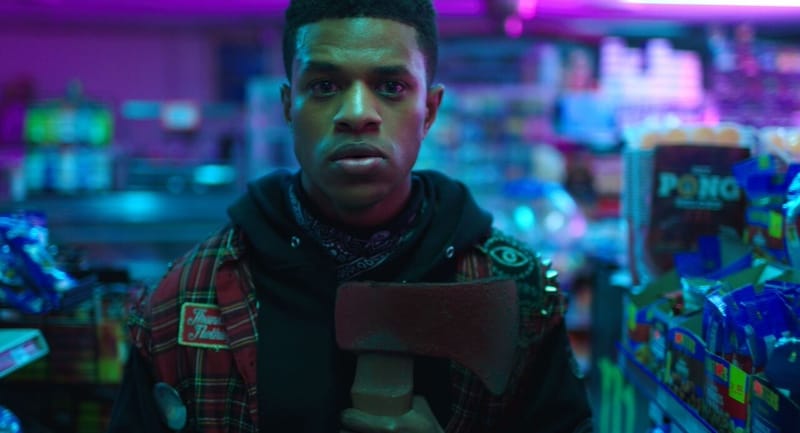
I feel like the 90s was a time when diversity was the butt of jokes. Like, let's include this diverse person for the sole purpose of tearing him down. I don't ever go back and watch "Friends" or shows like that, but when I think about them, I feel like my brain was being poisoned as a young teenager. I have so many problems with them now. I want to live in a world where there's diversity on screen and there's no need to call attention to it.

